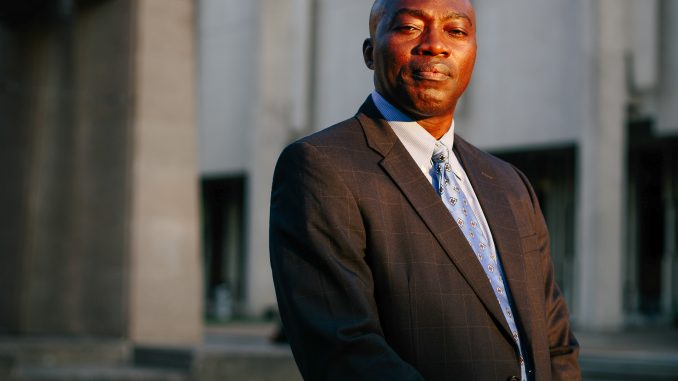
It took five years of being asked to run for president of Liberia before Richard Miller finally obliged.
Miller, a 1998 strategic management and international business administration alumnus, is running for president of Liberia in the country’s October 2017 election. With his Liberians for Prosperity Party, he hopes to bring progressive change to Liberia, which has experienced corruption, poverty and other socioeconomic issues for the last several decades, he said.
Miller grew up in Monrovia, Liberia’s capital.
The Liberian native arrived in the United States with his brother in 1989, shortly after the First Liberian Civil War erupted in the country. He recalled lying on the floor in his Liberian home and hearing a bullet graze the top of his glass window during the beginning of the civil war.
“There were so many checkpoints with folks with assault weapons in your face, until we made it to the airport and we left the country,” Miller said.
He enrolled in Temple for his undergraduate degree and planned to go right back to Liberia after college to work in a family business or start his own. Due to Liberia’s “economic and political turmoil” at the time, he said, those plans were cut short.
After Temple, he earned a master’s in business administration from Eastern University and a master’s in environmental protection and safety management from Saint Joseph’s University. He also was a partner in Tea Country, a tea shop on Main Campus in 2007, which closed two years later after the economic recession.
Miller had no desire to be a politician.
“During my years here in the United States, like many Liberians, I was distressed with what was happening politically in Liberia,” Miller said.
After two civil wars over 14 years, current President Ellen Johnson Sirleaf, was elected. Many, including Miller, began to go back to Liberia to see what they could do in different communities to help with lack of access to electricity, water and healthcare.
“Those experiences remain with many of us, so the love and compassion for humanity was the driving force for me and many others,” Miller said. “But along the way a lot of the folks we worked with at some point began to ask me to run for political office.”
Miller’s colleagues saw his “natural leadership abilities,” knew of his education, experience and his “compassion,” he said.
“We have all at some point sat in tents, mud houses and shared tears because we were looking for someone to lift our country and people out of despair,” Miller said.
Miller announced his candidacy for president of Liberia in November 2015. He has financed his campaign with limited resources, primarily through his own savings.
Ora Darway, the chairwoman of Liberians for Prosperity, said if Miller becomes president, Liberia will no longer face corruption.
“He is sincere, honest and hardworking,” Darway said. “We need a leader that will move our country forward so our children will have a future.”
Miller said there is a lack of “accountability and transparency” among Liberian politicians, which inspired the creation of the party.
“[In the United States,] if a politician says they are going to a build a school, that school will be built,” said Miller, who is running opposed to 21 candidates. “In Liberia, that money would be allocated to the politician and they would put it in their pocket.”
Most of Miller’s 4,000 supporters are in Liberia, he said, but hopes to build a campaign in the United States.
Harvey Collier, the father of Miller’s fiancée, said Miller would be a “God-send” for the country.
“I believe he would be a 22nd-century president,” Collier said. “He knows what democracy is about and the last two presidents haven’t shown democracy except to themselves and their cohorts.”
Some of his more tangible hopes for his presidency are to amend Liberia’s Decent Work Bill, which set minimum wage at $6 per day and the Alien and Nationality Law, which recognizes children of Liberian men born outside of the country as citizens, but not children of Liberian women.
“These laws have remained in place and outdated for all of these years,” Miller said. There’s never been an amendment to change the constitution and fully recognize Liberian women … we are going to amend the constitution and that is our hope.”
Miller, who plans to go back to Liberia in a few months, has lingered in the U.S. to gain resources and financial backing.
If he becomes president, Miller hopes to continue to strengthen the relationship between Liberia and the U.S.
“Liberia is considered the stepchild of the United States, so we are regarded by our African counterparts as the Africans who are American because of our love of this country,” Miller said. “It would be great to work as an ally and seek United States’ support.”
Emily Scott can be reached at emily.ivy.scott@temple.edu.


Be the first to comment